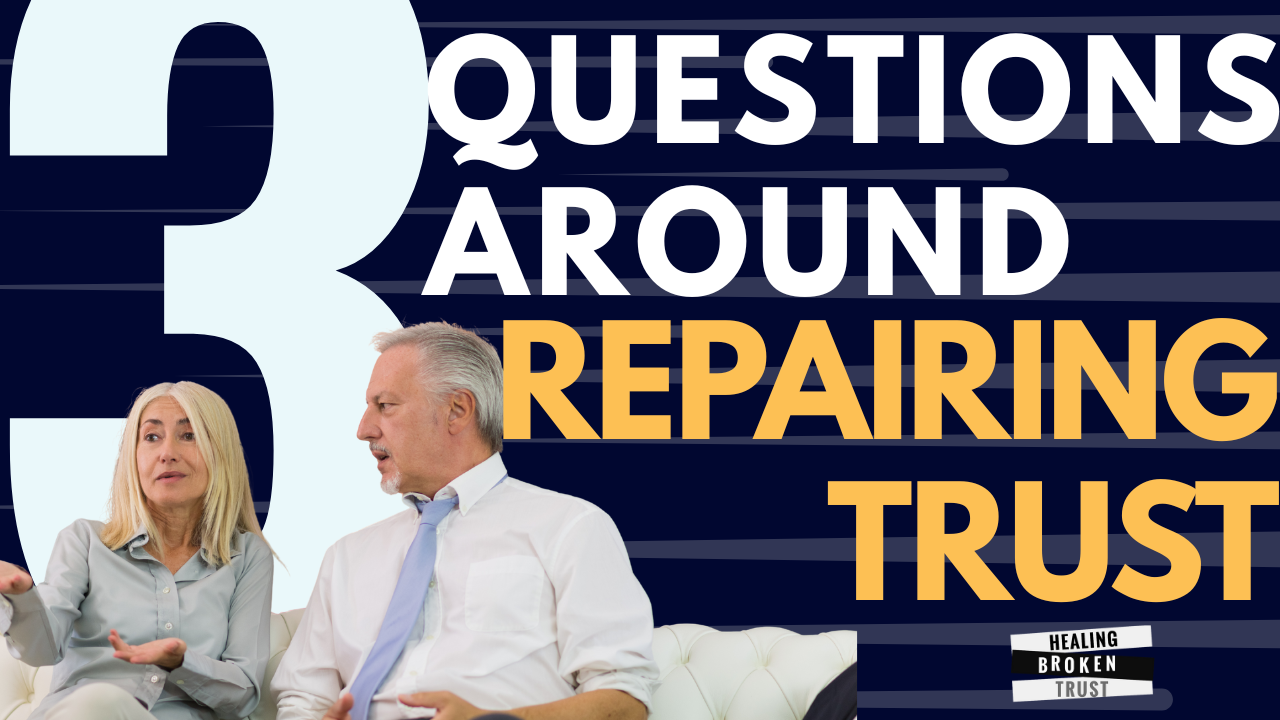I was reluctant at first to come to the workshop. I was thinking, this is three years later. I've read a lot of books. I've been through other workshops and I thought, if I go to this, is it going to make a difference? How is it going to change where we've been, what we've gone through, and that hopeless despair feeling? I was just reluctant and I wasn't sure that anything really was going to help at this point because after three years of working at this and working at this, we were caught in such a negative cycle that the workshop reluctantly as I came, I realized, oh my God, this is really exactly what we need. And everything that we covered reflected where I was at. And I could identify with it and I could see exactly where I fit in that. I understood my spouse better.
Why the Betrayed Partner Needs Answers After Infidelity: Understanding the Trauma of Broken Trust
If you’ve experienced infidelity in your marriage, you already know this: the questions don’t just go away.
They surface late at night. They interrupt everyday moments. They attach themselves to memories that once felt safe. For many betrayed spouses, the need for answers after an affair can feel overwhelming—not because they want to punish their partner, but because their mind simply cannot rest without clarity.
In our work helping couples heal from broken trust, we consistently hear the same thing: “I’m not asking for details to hurt you. I’m asking because I can’t feel safe without them.”
If you are the betrayed partner, this will likely resonate deeply. If you are the unfaithful partner, this may help you understand why questions about the affair feel so urgent and persistent.
Let’s explore why answers matter so much in affair recovery.
Why Does My Partner Freeze, Shut Down, or Say the Wrong Thing After Infidelity?
Understanding Emotional Shutdown After an Affair: Why does my partner freeze, shut down, or say the wrong thing when I’m falling apart?
In this episode we break down the hidden pain points many unfaithful partners carry after an affair—not to excuse what happened, but to name what’s going on inside. The shame that says, “I am bad,” the fear of losing everything, and the panic of not knowing how to respond when your spouse is devastated.
We also cover the feeling that nothing you do is ever enough, the heavy weight of guilt and moral injury, and why many people withdraw or avoid because the conversations feel unbearable.
Why Unfaithful Partners Shut Down After an Affair
We have 11 different things to cover today.
The 10 Biggest Pain Points Betrayed Partners Face After Infidelity
Have You Completed the CORE 24? They are the Core 24 episodes that lay the foundation for healing broken trust in your marriage after infidelity. Start HERE.
(And Why You’re Not Crazy for Feeling This Way)
If you’ve been betrayed by the person you trusted most, let’s start here:
You are not crazy.
You are not weak.
And you are not “overreacting.”
What you’re experiencing are real trauma responses—and there is a path forward that doesn’t waste your time, energy, or emotional resources.
Below are the 10 most common pain points betrayed partners face after infidelity, drawn from years of working directly with couples navigating broken trust. These aren’t listed in any particular order, but if you recognize yourself in several of them, you’re not alone.
Why Talking About the Affair (Like This) Isn’t Helping You Heal
Why Healing After Betrayal Feels Impossible (And How to Break the Cycle)
Healing after betrayal can feel impossible when couples get stuck in a negative cycle. The hurt partner repeatedly emphasizes how painful and damaging the betrayal was, while the partner who caused harm defends themselves by minimizing the impact with statements like, “It wasn’t that serious,” “I had a reason,” or “You’re overreacting.”
Research shows that perpetrators often downplay harm, while victims naturally focus on the impact. But in strong romantic relationships, victims aren’t always “maximizing” as much as we assume. More often, the real obstacle to healing is the Distancer’s minimizing, which blocks emotional safety and creates a second injury on top of the original betrayal.
In this video, we break down how this cycle works in affair recovery, why interpretation matters as much as behavior, and how healing begins when the unfaithful partner shifts from defensiveness to responsibility (“I understand why it feels that big”), while the betrayed partner shifts from endless interrogation to trust-building questions (“What are you doing to make sure it never happens again?”).
When couples learn to hold both truths, the damage was real and repair is possible, they stop repeating the same fight and begin rebuilding trust through accountability, safer meaning-making, and forgiveness that actually lasts.
Help! My Spouse Wants to Reconcile But Still Thinks the Affair Partner Is Good
Affair Nostalgia: When the Past Affair Blocks Healing and Reconciliation
One of the most painful and confusing roadblocks couples face after infidelity is something many people don’t have language for—but feel deeply. It’s called affair nostalgia.
We recently received a listener question that captures this struggle perfectly:
“My husband says the only thing he feels bad about regarding his two-year affair is hurting me. He’s not sorry that he found happiness with his affair partner. I want to reconcile, but if he will always see his affair partner in a good light, I can’t move forward.”
3 Stages That Explain Why You Haven't Rebuilt Trust Yet
Today we’re going to talk about how trust actually gets repaired after it’s been broken, using a research-based model that explains why “just apologize” often doesn’t work the way people hope it will.
Here’s the big idea: trust repair is not a one-person project. It’s a two-way, back-and-forth process between two people. On one side is the trust or (the person who was hurt and whose trust was violated). On the other side is the trustee (the person who caused the damage, or is accused of causing it).
Why Isn’t the Unfaithful Sorry for their Affair? Why Can’t They Show Remorse?
Why the Unfaithful Partner Isn’t Sorry (Yet): The Apology Mismatch After an Affair
After infidelity, one of the most confusing and painful experiences for the betrayed partner is this: “Why aren’t they sorry?” Or if they do say sorry, it feels flat, defensive, or rushed—like they’re trying to move on without truly understanding what they’ve done.
Meanwhile, the unfaithful partner often feels equally frustrated: “I said I’m sorry—why isn’t that enough?” Or even, if they’re being honest, “I don’t feel guilty… I’ve been hurt for a long time.”
This is one of the biggest reasons couples get stuck after betrayal—not because they don’t want healing, but because they are living in two totally different emotional realities. Research describes this dynamic as an apology mismatch, and it can stall recovery in a major way.
Let’s break down what’s happening, why remorse can be so hard to access after intentional betrayal, and what a real “healing apology” includes—so trust can start rebuilding step-by-step instead of looping the same pain.
The Apology Mismatch: Why You Want It Most When They’re Least Likely to Give It
Here’s the core of the mismatch:
The betrayed partner tends to need an apology most when the betrayal feels intentional—because intentional harm triggers anger, injustice, and the need for emotional repair.
The unfaithful partner is often more likely to apologize when they believe the harm was unintentional—because guilt is what drives apology.
That difference matters. A lot.
Because guilt can be blocked by things like:
defensiveness (“You’re overreacting”)
rationalizing (“I had my reasons”)
shame (“I’m a terrible person, so I shut down”)
When an affair involved deliberate choices—secrecy, planning, repeated decisions—those blocks often become even stronger. The betrayed partner is thinking, “You chose this. Own it. Repair it.” And when that doesn’t happen, anger rises—not just because of the affair, but because of the feeling that the unfaithful partner still isn’t showing up as safe.
In other words, the absence of remorse becomes a second injury.
Why Some Unfaithful Partners Don’t Feel Guilty
Many unfaithful partners struggle to show remorse not because they’re incapable of caring, but because they’ve built an internal story that protects them from guilt.
1) “It was justified.”
A common pattern is justification. When guilt shows up, the unfaithful partner reminds themselves of how they were hurt:
“I was lonely.”
“I felt rejected.”
“You weren’t there for me.”
“I’ve been living with pain for years.”
One person put it bluntly: whenever guilt surfaced, they would simply replay how their spouse had hurt them. That justification helped them shut guilt down.
To be clear: explanations are not the same as justification. There can be real pain in the relationship, real loneliness, real disconnection—and none of that makes betrayal the right answer. But justification is exactly what blocks remorse. If I feel I had a “good reason,” I’m far less likely to take full ownership.
2) “It was circumstantial. It wasn’t really me.”
Some people minimize responsibility by blaming circumstances:
“I had too much to drink.”
“It was a one-night thing.”
“They came on to me.”
“I was at a low point.”
The story becomes: This happened to me. Not: I chose this.
3) Moral disengagement: staying a “good person” while doing harm
Another powerful blocker is what researchers call moral disengagement—mental moves that allow someone to violate their values while still feeling like a good person.
This often looks like:
twisting the behavior into something “understandable”
downplaying consequences
focusing only on personal pain and ignoring the partner’s trauma
It creates what you might call selective morality: “I’m a good person… except in this area.”
The result? The apology, if it comes, is often polite and shallow—more about ending the conflict than repairing the damage.
4) Avoidant attachment and resentment
Avoidant attachment can also fuel a hidden resentment that blocks remorse. The defining trait of avoidant attachment is not using proximity-seeking—not turning toward a partner to ask for help, express needs, or fight for repair.
So instead of saying, “I’m struggling. I feel alone. I need something to change,” they shut down. Over time, silence becomes resentment. Resentment becomes justification. And justification becomes permission.
Again, this does not excuse betrayal. But it explains why some unfaithful partners don’t immediately “snap out of it” when the affair is discovered. Their internal logic doesn’t dissolve overnight.
Why Couples Can’t Agree on What the Affair Means
After betrayal, couples often differ in three critical ways:
Who is responsible?
The betrayed partner thinks: “You had the affair. You’re responsible.”
The unfaithful partner may respond: “I wouldn’t have done this if you hadn’t hurt me when…”
…and then they list old injuries: a miscarriage, rejection, emotional abandonment, years of feeling unseen.
This is one of the most painful moments in recovery. The betrayed partner hears it as blame. The unfaithful partner experiences it as context.
How significant it is
Betrayed partners tend to experience the affair as enormous—identity-shattering, reality-altering.
Unfaithful partners often minimize:
“It didn’t mean anything.”
“It was just sex.”
“I never loved them.”
But betrayal trauma isn’t primarily about sex. It’s about safety, attachment, and reality. Minimization destroys safety.
The long-term effects
The betrayed partner thinks: “This changed everything.”
The unfaithful partner may believe: “You’ll be fine. This will blow over.”
Not always because they don’t care—sometimes because it’s too painful to sit with the depth of what they’ve done. If they truly take it in, it shatters their self-image.
The Needs-Based Model: Why Victims Feel Anger and Offenders Feel Guilt
A helpful framework from relationship research is the needs-based model of reconciliation.
Victims (betrayed partners) often feel anger because anger is tied to injustice: something was taken from me; something must be repaired.
Offenders (unfaithful partners) often feel guilt, especially when they fear rejection, exclusion, or losing the relationship.
Here’s a crucial point: anger doesn’t always mean “I’m done.” Often it means, “This matters. Please show up. Fix this.” Anger can be protective—protecting the relationship, the betrayed partner’s heart, and the need for truth.
But the irony is that the unfaithful partner often experiences that anger as proof that repair is impossible: “She’ll never forgive me. I’ve done too much.” And then they shut down, withdraw, or get defensive—making the betrayed partner even angrier.
That’s how the negative cycle intensifies.
Why Apologies Often Fail After Intentional Betrayal
When betrayal is perceived as intentional, victims want an apology most—yet offenders are least likely to offer a meaningful one. Why?
Because intentionality usually involves pre-planned rationalizations. People tell themselves stories in advance to buffer guilt. And when guilt is low, apology motivation is low.
Sometimes guilt arrives later—months later—after the rationalizations collapse. The unfaithful partner finally says, “Oh my gosh. I really get what I did.” The betrayed partner may feel relieved—and furious: “Where was this on day one?”
This is common. It’s also one reason healing is rarely linear.
What an Apology Really Means to Each Partner
The unfaithful partner often experiences apology as:
a way to distance themselves from wrongdoing (“This isn’t who I am”)
a way to reduce relational damage and restore connection
The betrayed partner often experiences apology as:
emotional compensation (“You see what you did to me”)
a restoration of fairness and justice
a doorway to reconciliation: “If you can’t even own it, how can I move forward?”
And here’s the hard truth: the injured partner’s need for an apology often does not determine whether it happens. Apologies tend to track the offender’s readiness—what they can tolerate emotionally, what they’re willing to face.
That’s why couples often need help removing the blocks.
When the Betrayer Needs Healing First (Yes, Really)
This part can feel backwards: sometimes, for the unfaithful partner to become a healer, you have to start with their hurt, resentment, or shame.
That doesn’t mean excusing the affair. It means addressing what is preventing accountability.
If the unfaithful partner is buried under resentment (“I’ve been hurt for years”), shame (“I’m unlovable”), or avoidance (“I can’t handle conflict”), they may be unable to offer remorse in a way that actually heals.
And the betrayed partner can understandably resent that: “You betrayed me, and now I have to help you?”
This is why the healing process requires structure. You’re often working in three lanes at once:
betrayal trauma
affair-related truth and repair
broader relationship patterns
The Healing Apology: A Script That Builds Trust
A true apology includes:
clear ownership
empathy for impact
no justification
a change plan
patience with the healing timeline







